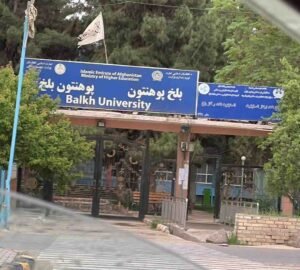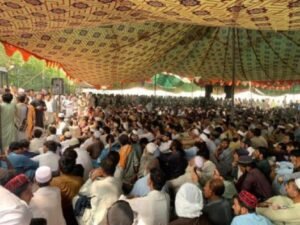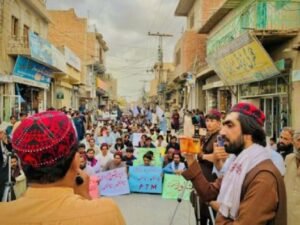The More the Taliban Suppress Afghan Women, the Stronger the Women Become

Photo: @Ali Ahmad
By Ali Ahmad
Vienna (14.01.2023): On the 20th of December, the de facto authorities in Afghanistan instructed all private and public universities to halt access by female students until further notice. The prohibition sparked domestic and international outrage. Four days later, the Taliban issued an order to suspend female employees in national and international non-governmental organizations (NGOs). The insurgent-turned-de facto rulers claimed that some women had failed to comply with the strict dress code that the Taliban had set since their return to power in August 2021.
To condemn the Taliban’s brutal policy of closure of schools and universities and women’s suspension in NGOs, the Afghan diaspora participated in a global movement for women’s rights in Afghanistan. The global protest for women’s rights took place in 24 countries and 58 cities from Asia, Europe, the Middle East, Africa and North and South America. The Vienna protest was one leg of this global movement. Hashtags and campaign slogans such as #LetAfghanGirlsLearn and #AllOrNone were the two leading slogans that demonstrators chanted during protests and shared on social media platforms.
The protest started at 14:00 on the 14th of January next to the city’s famous Opera building called in Vienna There was a mix of Afghan diaspora and non-Afghan participants from der Funke, a socialist movement based in Vienna that fights capitalism in over 40 countries worldwide.
„The more the Taliban suppress the Afghan women, the stronger the women become,” said a young Afghan female activist to nearly 100 demonstrators. “The story of Afghan women is the story of forgotten land that is never told in the Western world,” she expressed her disappointment about the international community remaining silent about the Taliban’s brutal policies which include banning Afghan girls and women from schools, universities, and work.
The organizers distributed a key list of slogans to participants on a mild cold Saturday afternoon. The stage was set in a mini truck with the Afghan flag hanging on the truck. The slogans included, “work, bread, freedom”, “women’s rights are human rights”, “sanction Taliban”, “say No to Taliban rule”, “stop gender apartheid”, “no to Taliban and no to Taliban’s law”, and “education, work, freedom”. These slogans were chanted after each speaker delivered their short speech. After an hour of chants, the protesters marched about 45 minutes along the ring road to the Haus der Europäischen Union, near the University of Vienna.
Austria is home to a sizable Afghan diaspora. Since the beginning of the Afghan forced migration in 1978, their number has continuously grown, and many have arrived since 2015. Nearly half of the 45,120 Afghans who live in Austria reside in Vienna. They are divided along linguistic, ethnic, religious, and ideological grounds. Even though it appeared to be a “global protest,” only a minority of the Afghan diaspora participated in the demonstration to condemn the Taliban.
“The hopes and the 20 years of achievements of Afghan girls and women have vanished. Girls’ schools were closed, women lost their jobs, and they were accused of immorality, and erased from public life,” Abeda Spozhmai, a Vienna-based Afghan female journalist read her speech in front of the Haus der Europäischen Union in Vienna. Spozhmai also stated that education is a basic human right and no one should be deprived of this basic right.
Similarly, Wasil Faizi, a student of sociology at the University of Vienna and one of the main organizers of the Vienna demonstration accused the EU and USA of lying to the people of Afghanistan over the past 20 years. Faizi asked, “Why do Afghan women have to fight for their rights all by themselves? Why are the Afghan women on the streets of Kabul alone and there is no solidarity from the EU and USA?” He believes the West justified Afghanistan’s invasion by lying to the people and saying that they would defend women’s and human rights. “They handed over Afghanistan to the Taliban and the USA disappeared with its puppets,” pointing to the U.S.-backed Afghan government that was overrun by the Taliban on the 15th of August 2021.
The slogan “work, bread and freedom” is one of the most progressive slogans in the Afghan political scene in 20 years. Faizi states that the Taliban could never fulfill this demand, neither could the former deposed corrupt government.
The Global Movement for Peace in Afghanistan who organized the global movement sent a list of demands for the EU and world policy makers. The group not only wants the Taliban to immediately open secondary schools and universities for girls, but it also wants to ensure a standard educational curriculum. They also demand that the international community should strictly monitor the humanitarian aid to Afghanistan and ensure it reaches the people in need.
During the demonstration in Vienna, Spozhmai called on Afghanistan’s de facto authorities to open all schools and universities for girls and women as soon as possible. Spozhmai believes the Taliban would not listen to her plea and wants the international community and EU to bring pressure on Kabul’s de facto authorities to end the ban on women’s education. “An educated society guarantees a bright future for us all. Without women, progress is not possible,” Spozhmai reminded the demonstrators.
The Afghan diaspora urged the international community to avoid recognizing the Taliban as a legitimate government. The diaspora believes that by recognizing the Taliban, other extremist and terrorist organizations will be inspired to undermine democracy and democratic ideals. To avoid giving the Taliban any political platform, the international community must shut down the Taliban’s diplomatic mission in Doha, Qatar, which has been open since 2013. Since the Taliban seized power in August 2021, no country has recognized them. However, for many demonstrators, the Doha office is viewed as indirect recognition of the Taliban. They also urged the UN to continue banning the Taliban leaders from traveling until they are prepared to form an inclusive and democratic administration.
Ali Ahmad is a Vienna-based researcher focusing on migration and diaspora studies.
Note: The contents of the article are of sole responsibility of the author. Afghan Diaspora Network will not be responsible for any inaccurate or incorrect statement in the articles.








